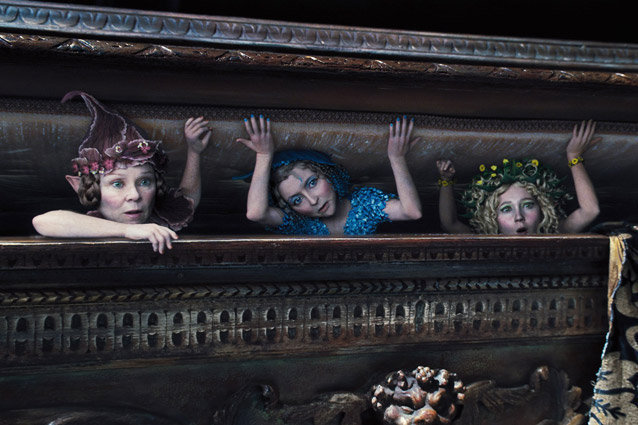As I watched
Maleficent toggle
between magic woodlands filled with trembling mushroom people and grim
battle scenes steeped in markedly misanthropic revenge tales, I had to
ask myself the question: who is this movie for? Too shallow for adults,
too dark and dull for kids, yet still too cutesy for teens... I left the
theater certain that
Angelina Jolie's
perplexing Disney twist wasn't for anyone, but in assessing the
aforementioned elements as pieces of a puzzle rather than conflicting
forces, I've come to realize just the opposite:
Maleficent is for all people, because
Maleficent is
about all people. To be more precise, the film's structure is modeled after the lifespan of a human being.
Like all people,
Maleficent starts out simple, unbearably bright, and cloyingly enchanted with everything around it — as a lass,
fairy princess Maleficent (played by a preteen
Isobelle Molloy) scrambles through her fairy-laden home, giggling like a
Care Bear
with the variety of natural abominations she calls friends
(elephant-frogs, tree-skeletons, troll-rabbits). It's sweet enough to
invite anaphylaxis.
 Walt Disney Studios via Everett Collection
Walt Disney Studios via Everett Collection
It then grows into its teen years: brooding and self-serious — an older Maleficent (now
Ella Purnell) falls horns-over-wingtips for some dope named Stefan, who vows his true love to her but is
totes just being a selfish d-
bag — followed by the violent hostility of its young adulthood — Stefon (
Sharlto Copley, affecting a
bad guy in an
Animaniacs period
sketch)
betrays Maleficent (finally Jolie, who cuts through the thick, musty
sheaths of aimless convolution with her incredible screen charisma... or
maybe just those diabolical cheekbones) by stealing her wings,
earning
his place as king and setting her off on a course of bitter revenge.
For a long while thereafter,
Maleficent settles into adulthood: cynical, mechanical, apparently bored with its life altogether (this after Maleficent dooms
King Stefon's baby daughter Aurora to the curse of
eventual eternal sleep) ... that is, until a change in
direction affords it a short-lived whimsy that perks up the
energy just enough to keep it (and us) trucking to the end. If we can work our way past
Imelda Staunton,
Leslie Manville, and
Juno Temple as the insufferable and incompetent fairies charged with caring over young Aurora (
Elle Fanning, but without the usual moxy).
Of course, before it gets there, it endures the ever faithful
mid-life
crisis, ushers in a resurgence of misguided passion that never had much
place in the formula to begin with and certainly doesn't seem at all at
home this time around — this is an era of ghost-fish,
dragon-fights,
and plot contrivances out the wazoo. But finally, the film settles on
the tranquility of willful disregard, knowing that there's nothing it
can now do about its lifetime of shortcomings, happily committing to
memories of the things it loved most: reptile-pachyderm hybrids,
diabolical cheekbones, and the narration of
Janet McTeer. Like any human,
Maleficent leaves the
world
with more questions than answers, and ones we're all better off
relegating to a few short words upon its passing and then forgetting
altogether.
And, much like all people, it's not very good. Fine. Not altogether
bad. But mostly just brazenly unimportant.









































